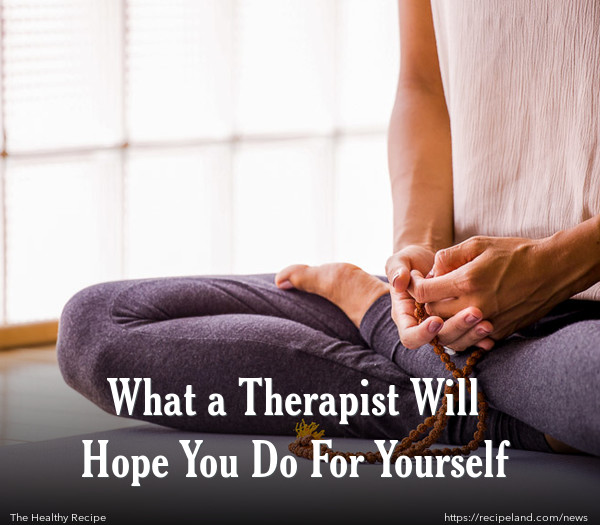Everybody struggles at some point, even if you do not have anxiety or depression. Not everyone needs to see a therapist when their lives feel a bit crazy or overwhelming, but there is some advice that therapists tend to give that is pretty universal.
Here are some of the top examples of great advice that you might want to think about, even if you don’t think you need to see a therapist.
1. Take it easier on yourself.
Most people are harsh self critics. Daniela Tempesta, LCSW, a psychotherapist from the San Francisco area, stated, “I think people mistakenly believe that being hard on themselves helps them. They have this idea that if they punish themselves with negative thoughts, they might stay on track.” Unfortunately, most therapists believe that the exact opposite is true.
Tempesta explains, “Research shows over and over again that we’re more likely to repeat bad behaviour if we’re hard on ourselves than if we take a step back and show ourselves some compassion.” Most believe that this will help to increase our resiliency and confidence, and help us make healthier, positive choices. This can be difficult for some people to put into practice, because it is truly a very big change for many people. Being kinder to yourself takes practice, but practice talking to yourself and treating yourself as you would your friends.
2. Consider why you are jealous.
For those who spend endless hours looking at cute kids or vacation pictures on Facebook or other social media, it’s important to realize that this is not really a picture of reality for most people.
Be careful what you are comparing yourself to. Are you seeing things you want for yourself? If so, then you need to figure out how to redirect your energy, instead of comparing yourself and feeling inferior or less successful than others.
3. Meditate and practice mindfulness.
This is something you are probably hearing more and more often. Marlynn Wei, M.D., a board-certified psychiatrist, certified yoga teacher, and author of The Harvard Medical School Guide to Yoga, explains that mindfulness and meditation works when you are trying to improve your self image.
These techniques help to activate your parasympathetic nervous system, which is responsible for countering stress in your body. The more you practice meditation and mindfulness, the more it works to counteract feelings of anxiety and depression, and provide additional health benefits.
4. Don’t be afraid to fail.
It’s important that we learn to fail. This helps us learn to not overreact to small problems. There are certainly different levels of failure, but, overall, it’s not as bad as it seems.
Guy Winch, Ph.D., a psychologist from New York City, emphasizes that “Failure creates a distortion in our brain. It leads us to believe that the task we failed at is more difficult than it actually is, and that our abilities are not up to snuff.” When we learn how to fail, we realize how much we can actually handle, and that we can succeed.
5. Distract yourself from obsessing.
It can be easy to fall into a pattern of obsessing over certain problems, events, or situations. Winch cautions that this can be harmful, and states, “You’re not learning anything new, you’re not problem solving, you’re not gaining a fresh perspective, you’re just replaying it.”
Those who are likely to ruminate are more likely to develop clinical depression and suffer more from it than those who are able to distract themselves. Winch states that sometimes all it takes is a two-minute distraction from the rumination to break the cycle. This might be a crossword puzzle, a phone call to a friend, a rote memory task like remembering songs or a shopping list, or watching a short video.
6. Reach out to others when you feel lonely.
Those struggling with loneliness are not likely to talk about it with others, which can make it quite habit-forming and difficult to change. Winch explains that, like failure, loneliness can distort our perceptions. “It makes us believe that the relationships we have are not as strong as they actually are and that people don’t care for us as much as they actually do.”
Loneliness make people more avoidant, which will increase the feelings of loneliness. Winch makes it clear that interacting with others can help, even when it’s electronically. “We have a lot of people we’re in contact with today electronically, so we have a lot of people we could talk to, reach out to, make plans with. Take action.”
7. Assume good things will happen.
Many people tend to focus on the worst-case scenarios, which can lead to problems with depression. Jumping to conclusions and making assumptions is not healthy. Unless you have a true reason to expect a negative outcome, practice planning for the best possible scenarios. Winch encourages us to look for alternate reasons for why bad things might happen, other than worst-case scenarios.
For example, when trying to make plans with five people and only two respond, don’t assume that the other three are not interested. They might just be busy. “It’s better for use emotionally to go with a lighter and more compassionate explanation, because that tends to be the more reasonable one.”
8. Happiness is not always the end goal.
Our society is very focused on being happy, and it can put a lot of pressure on those who are not currently happy. Wei stated, “This might be counterintuitive, but I don’t even know that happiness is necessarily a good end goal.
I think sometimes it’s more about being fulfilled or having some meaning, because often people go through really hard things…and there is actually suffering or difficulty.” It is important to recognize whatever your feelings are and be okay with them, instead of spending too much time and energy trying to escape.
9. Monitor your psychological health.
We are trained to monitor our physical symptoms, but often overlook our psychological health. It is important to be aware of how you are doing, and take necessary steps to change things when there is a problem. Especially when something difficult happens, it is important to take stock of how you are feeling to make sure you don’t need to take better care of yourself. This helps prevent us from becoming stuck in a bad place.
Maybe you don’t need to see a therapist, but you will probably benefit from these helpful tips.










Comments